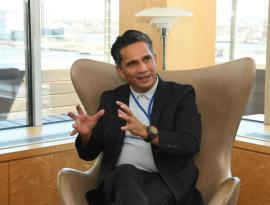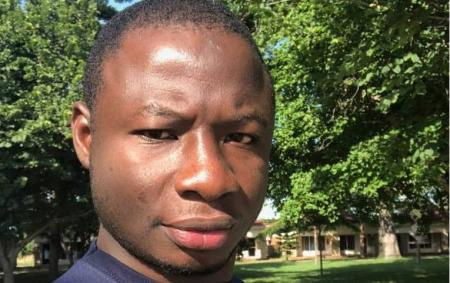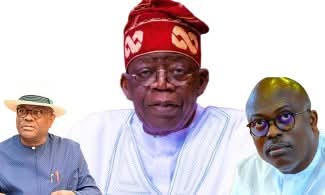Politicians Are Enemies Of Democracy In Nigeria, By Opaluwa Ogacheko | Sahara Reporters
The history of political evolution in Nigeria reveals that politicians, rather than soldiers, are the true adversaries of democratic governance in the country. Soldiers are merely opportunistic adventurers who occasionally exploit the reckless antics of politicians to ascend to political power.
This pattern began in 1966 in western Nigeria, where political treachery and unchecked personal ambitions ignited a fratricidal inferno that engulfed the nation in coups and counter-coups, culminating in a devastating civil war. Nigeria emerged from this avoidable crisis through divine intervention, for those who believe in a higher power.
Once again, in western Nigeria—specifically Ondo State—political intrigues paved the way for our 'gambari' rulers, or political oppressors, to gain a foothold in the Oduduwa enclave through election rigging and political violence. However, the military did not allow these issues to escalate into the destructive chaos of the First Republic before intervening to end late President Shehu Shagari's Second Republic. The soldiers' extended stay in political power nearly led to the permanent displacement of politicians, until they grew weary of the constant complaints and criticisms from the political class.
Politicians reclaimed power in 1999 and have remained entrenched ever since. While Nigerians yearned for democracy and prayed for its success, no politician wanted the military to rule again. Democracy is the global standard, and Nigeria is no exception.
Yet, Nigerian politicians have demonstrated, from 1999 to the present, that they have learned nothing and forgotten everything. From former President Olusegun Obasanjo's third-term ambition to his authoritarian selection of late President Umar Yar'Adua as his successor, and the manipulations of a greedy cabal surrounding Yar'Adua's secret illness and eventual death, Nigerians have witnessed the unchanging nature of their politicians.
Although former President Goodluck Jonathan, who succeeded Yar'Adua, was a fresh face in politics, his administration was marked by corruption and inefficiency. This led to his unceremonious removal by a coalition of political forces rallying behind a self-proclaimed democrat and critic of the military. From that point onward, Nigerians began to regret their decision to entrust power to politicians.
They clung to hope with the taciturn former President, retired General Muhammadu Buhari, whose eight-year tenure turned out to be the worst in Nigeria's political history, much to the dismay of his supporters.
He handed over power to President Bola Ahmed Tinubu under a "turn-by-turn" arrangement, becoming Nigeria's leader under the "Renewed Hope" mantra. Today, hope seems elusive, let alone renewed. This is the legacy of Nigerian politicians.
What frustrates me the most is the impunity and political recklessness displayed by many of Nigeria's 36 state governors, with no mechanisms in place to hold them accountable. As you read this, state resources have effectively become the personal assets of governors and public officials in Nigeria.
The governors, in particular, divert state resources for personal enrichment, using them to illegally acquire properties at home and abroad. They also indulge their families in extravagant travel while using stolen state funds to secure the loyalty of state security agencies, which they deploy to harass, intimidate, and even eliminate real or perceived opponents.
Take Kogi State as an example. Former Governor Yahaya Adoza Bello rose to power through a combination of divine providence and political manipulation by a handful of ethno-religious extremists.
He governed Kogi State with an iron fist, plundering the state's resources and using security agencies to silence dissent, sometimes with deadly consequences. The youthful political outsider, whom many had hoped would bring transparency and accountability, instead became one of the worst political despots in the history of Nigerian state politics.
Many Nigerians still recall how, with the backing of former President Muhammadu Buhari, Bello used state resources and security apparatus to rig his way back into office for a second term in 2019. When Buhari left office, many assumed Bello's political influence would diminish.
However, he managed to secure a third term through proxy by installing a weak, compliant relative as the APC gubernatorial candidate for Kogi State in 2023. With the help of INEC, Bello ensured that his proxy was installed in Lugard House.
In reality, it is still Yahaya Bello running Kogi State, controlling state resources and using them to buy judicial rulings and political favours. The Nigerian constitution and President Bola Ahmed Tinubu have been powerless to stop him because Bello has entrenched himself with the backing of a compromised judiciary.
Currently, Bello is orchestrating a scheme to recall Senator Natasha Akpoti-Uduaghan, who represents Kogi Central in the Senate. Natasha’s victory in a rerun election denied Bello a foothold in the Senate, as his candidate would have served as a placeholder for him. After Natasha’s suspension following a clash with Senate President Godswill Akpabio, Bello saw an opportunity to reclaim the seat through a recall campaign.
Using state resources, Bello’s agents lured Natasha’s supporters with promises of an empowerment programme. Attendees were asked to bring their voter cards and NIN for "verification" before being added to the list of beneficiaries. They were also asked to sign a register, which was later repurposed as a petition for Natasha's recall. When the supporters realized the deception, they protested, forcing Bello’s agents to retreat. Despite the backlash, the agents continued to compile false signatures to support the recall petition, as seen in viral videos circulating on social media.
This is not about Yahaya Bello’s corruption or political manipulation — those are well-known. The real issue is how far Nigeria’s political system has decayed, allowing such impunity to thrive. It is alarming that despite widespread awareness of Bello’s recall scheme — including by the Nigerian President, Senate President, Speaker of the House of Representatives, Chief Justice of the Federation, INEC Chairman (who will eventually oversee the recall), and the Inspector General of Police — Bello may still succeed without consequence.
Bello’s tactics are not new. When Muritala Yakubu Ajaka (Muri), a former APC National EXCO member and former ally of Bello, sought to win the APC gubernatorial ticket in 2023, Bello used similar tactics. He sent his agents to Muri’s ward in Ajaka town, Igala Mela/Odolu local government area, to convene a meeting of APC ward executives.
At the meeting, they were promised "goodies" in exchange for their continued support of APC and Bello’s chosen candidate. The strategy worked, sidelining Muri and securing Bello’s hold on Kogi State through a proxy.
Bello’s continued grip on power reflects the deep rot in Nigeria’s political system — a system where impunity thrives, corruption is institutionalized, and political accountability is virtually nonexistent.
The ward EXCO members signed the document willingly, only to realize the true intention behind it after Yahaya Bello's emissaries returned to Lokoja, the Kogi State capital. Their names and signatures were attached to a letter allegedly written by the APC EXCO in Muri's ward in Ajaka town, falsely expelling Muri from the APC for anti-party activities. The state APC EXCO, led by one of Yahaya Bello's kinsmen, quickly ratified the expulsion and notified the APC national headquarters, which promptly endorsed the decision.
At the time, the APC gubernatorial primary election in Kogi State was just about four weeks away. Muri rushed to the court in a bid to stop or overturn the expulsion, but his efforts were futile.
The APC primary, which produced Yahaya Bello’s handpicked candidate and current proxy governor, proceeded without interference. It was yet another calculated move in Yahaya Bello's political playbook — a scheme of democratic theft that remains unmatched in its audacity. Neither the judiciary nor any institution could stop him then, and it seems no one can stop him now.
Now, Bello is back at his familiar game. Reports suggest that he is working alongside some of Natasha Akpoti-Uduaghan’s political adversaries, including fellow senators, to orchestrate her recall.
With such entrenched political manipulation, how can true democracy — one that serves the people rather than a select few — take root in Nigeria? Are these same politicians, who claim to be champions of democracy, not the ones threatening the very foundations of the country’s democratic system?
One thing is certain: Nigerian politicians will not have their way forever. The masses are becoming more enlightened and emboldened. They no longer need soldiers to intervene because military rule has repeatedly proven to be no better than corrupt civilian leadership. Instead, the people will reclaim their power through the electoral process. They will vote and defend their votes with determination, and no amount of intimidation from security agencies or manipulation by INEC officials will protect corrupt politicians from the people's resolve.
Not even the political schemes and manipulations of desperate figures like the former Kogi State governor will withstand the people's will.
I am reminded of the message in the title of one of the late novelist and poet Nadine Gordimer’s works about the collapse of apartheid in South Africa: Some Monday for Sure. Gordimer predicted that one perfect Monday morning, South Africa would become a free and democratic country where the majority would finally prevail. Her prediction came true on April 27, 1994, when Nelson Mandela was elected as South Africa's first black president.
In the same spirit, I believe that Nigeria’s electoral system will one day become so strong and transparent that no corrupt politician or political party will be able to manipulate it as they do today. That bright Monday morning will surely come — Amen!











